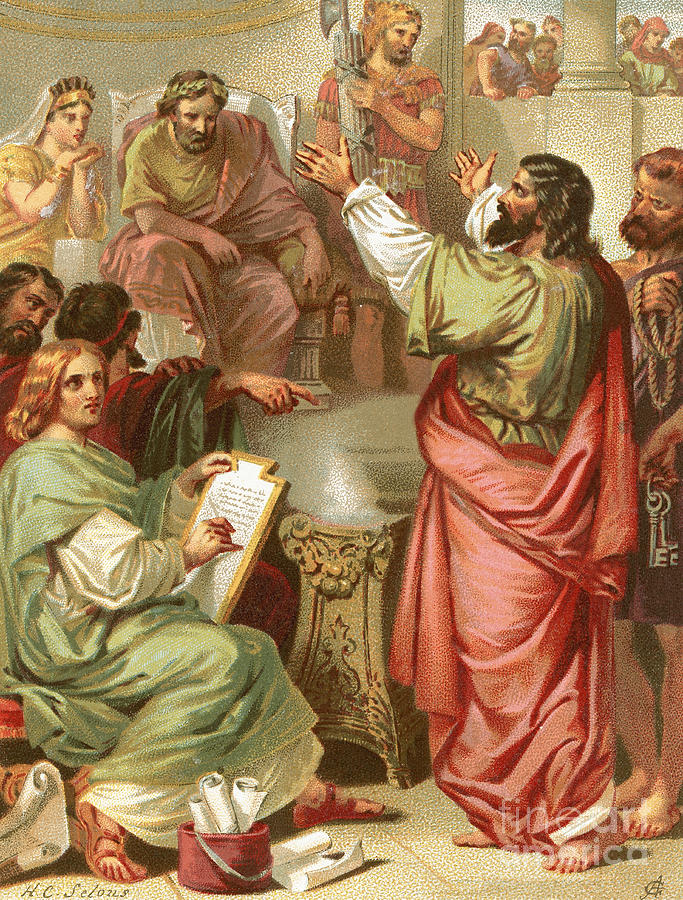In this series, we're using the Acts of the Apostles to discuss the growth of the earlier church from its birth in the city of Jerusalem to Paul’s arrival in Rome. During our time together, we’ll look at the following:
- Session 1 - Preparing for the Journey (Acts 1:1-2)
- Session 2 - Transition (Acts 1:3-26)
- Session 3 - Birth (Acts 2:1-47)
- Session 4 - The Work Begins (Acts 3:1-26)
- Session 5 - When Faced with Opposition (Acts 4:1-26)
- Session 6 - But... (Acts 5:1-42)
- Session 7 - Problem Solved (Acts 6:1-15)
- Session 8 - When Something Bad Happens (Acts 7:1-60)
- Session 9 - Step Two (Acts 8:1-40)
- Session 10 - Saul (Acts 9:1-43)
- Session 11 - Clean People (Acts 10:1-48)
- Session 12 - Phase Three Begins (Acts 11:1-30)
- Session 13 - Even Above Kings (Acts 12:1-25)
- Session 14 - The New Kid Takes the Stage (Acts 13:1-52)
- Session 15 - Approaching a New Community (Acts 14:1-28)
- Session 16 - Issue Resolved (Acts 15:1-41)
- Session 17 - A New World (Acts 16:1-40)
- Session 18 - Know Your Audience (Acts 17:1-34)
- Session 19 - The Big Time (Acts 18:1-28)
- Session 20 - Christ and Culture (Acts 19:1-41)
- Session 21 - Farewell (Acts 20:1-38)
- Session 22 - Jerusalem (Acts 21:1-40)
- Session 23 - A Personal Testimony (Acts 22:1-30)
- Session 24 - The Plot Thickens (Acts 23:1-35)
- Session 25 - The Way Continues (Acts 24:1-27)
- Session 26 - Different Singer, Same Song (Acts 25:1-27)
- Session 27 - A Message to God’s People (Acts 26:1-32)
- Session 28 - Will He Make It (Acts 27:1-44)
- Session 29 - Without Hindrance (Acts 28:1-31)
In our twenty-fourth session, we looked at Acts 24:1-27, Paul speaking to Felix in Caesarea. The discussion and passage are below:
Acts 24:1-27 [New Revised Standard Version]
Five days later the high priest Ananias came down with some elders and an attorney, a certain Tertullus, and they reported their case against Paul to the governor. When Paul had been summoned, Tertullus began to accuse him, saying: “Your Excellency, because of you we have long enjoyed peace, and reforms have been made for this people because of your foresight. We welcome this in every way and everywhere with utmost gratitude. But, to detain you no further, I beg you to hear us briefly with your customary graciousness. We have, in fact, found this man a pestilent fellow, an agitator among all the Jews throughout the world, and a ringleader of the sect of the Nazarenes. He even tried to profane the temple, and so we seized him. By examining him yourself you will be able to learn from him concerning everything of which we accuse him.” The Jews also joined in the charge by asserting that all this was true.
When the governor motioned to him to speak, Paul replied: “I cheerfully make my defense, knowing that for many years you have been a judge over this nation. As you can find out, it is not more than twelve days since I went up to worship in Jerusalem. They did not find me disputing with anyone in the temple or stirring up a crowd either in the synagogues or throughout the city. Neither can they prove to you the charge that they now bring against me. But this I admit to you, that according to the Way, which they call a sect, I worship the God of our ancestors, believing everything laid down according to the law or written in the prophets. I have a hope in God—a hope that they themselves also accept—that there will be a resurrection of both the righteous and the unrighteous. Therefore I do my best always to have a clear conscience toward God and all people. Now after some years I came to bring alms to my nation and to offer sacrifices. While I was doing this, they found me in the temple, completing the rite of purification, without any crowd or disturbance. But there were some Jews from Asia—they ought to be here before you to make an accusation, if they have anything against me. Or let these men here tell what crime they had found when I stood before the council, unless it was this one sentence that I called out while standing before them, ‘It is about the resurrection of the dead that I am on trial before you today.’”
But Felix, who was rather well informed about the Way, adjourned the hearing with the comment, “When Lysias the tribune comes down, I will decide your case.” Then he ordered the centurion to keep him in custody, but to let him have some liberty and not to prevent any of his friends from taking care of his needs. Some days later when Felix came with his wife Drusilla, who was Jewish, he sent for Paul and heard him speak concerning faith in Christ Jesus. And as he discussed justice, self-control, and the coming judgment, Felix became frightened and said, “Go away for the present; when I have an opportunity, I will send for you.” At the same time he hoped that money would be given him by Paul, and for that reason he used to send for him very often and converse with him. After two years had passed, Felix was succeeded by Porcius Festus; and since he wanted to grant the Jews a favor, Felix left Paul in prison.




No comments:
Post a Comment